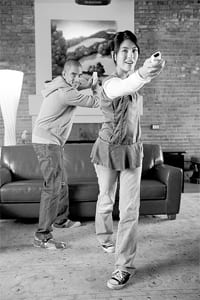Balancing Act – Why Many Older Americans Struggle with Dizziness, Lightheadedness
Have you ever been dizzy, lightheaded, or felt as if the room was spinning around you? These can be very troublesome sensations. If the feeling happens often, it could be a sign of a balance problem.
Balance problems are among the most common reasons that older adults seek help from a doctor. During a typical year, about 15{06cf2b9696b159f874511d23dbc893eb1ac83014175ed30550cfff22781411e5} of American adults report having a balance or dizziness problem.
Why Balance Is Important
Having good balance means being able to control and maintain your body’s position, whether you are moving or remaining still. An intact sense of balance helps you walk without staggering, get up from a chair without falling, climb stairs without tripping, and bend over without stumbling. Good balance is important to help you get around, stay independent, and carry out daily activities.
When Problems Arise
As they get older, many people experience problems with their sense of balance. They feel dizzy or unsteady, or as if they or their surroundings are in motion. Disturbances of the inner ear are a common cause. Vertigo, the feeling that you or the things around you are spinning, is also a common symptom.
Falls and fall-related injuries, such as hip fracture, can have a serious impact on an older person’s life. If you fall, it could limit your activities or make it impossible to live independently. Many people often become more isolated after a fall.
According to the Centers for Disease Control and Prevention, more than one-third of adults age 65 years and older fall each year. Among older adults, falls are the leading cause of injury-related deaths.
Benign Paroxysmal
Positional Vertigo
There are many types of balance disorders. One of the most common is benign paroxysmal positional vertigo, or BPPV. With BPPV, you experience a brief, intense feeling of vertigo when you change the position of your head, such as when rolling over to the left or right, upon getting out of bed, or when looking for an object on a high or low shelf. BPPV is more likely to occur in adults age 60 and older, but can also occur in younger people.
With BPPV, small calcium particles in the inner ear become displaced and hit the inner-ear balance sensors, causing dizziness. The reason they become displaced is not known; the cause may be an inner ear infection, head injury, or aging.
Labyrinthitis
The part of the inner ear responsible for balance is the labyrinth. To maintain your body’s position, the labyrinth interacts with other systems in the body, such as the eyes, bones, and joints.
Méniére’s Disease
Méniére’s disease is a balance disorder that causes a person to experience vertigo, hearing loss that comes and goes, tinnitus (a ringing or roaring in the ears), or a feeling of fullness in the ear. It affects adults of any age. The cause is unknown.
Bottom Line
There are many ways to treat balance disorders. Treatments vary depending on the cause. See your doctor if you are experiencing dizziness, vertigo, or other problems with your balance. v
This article was prepared by the National Institutes of Health.


Comments are closed.